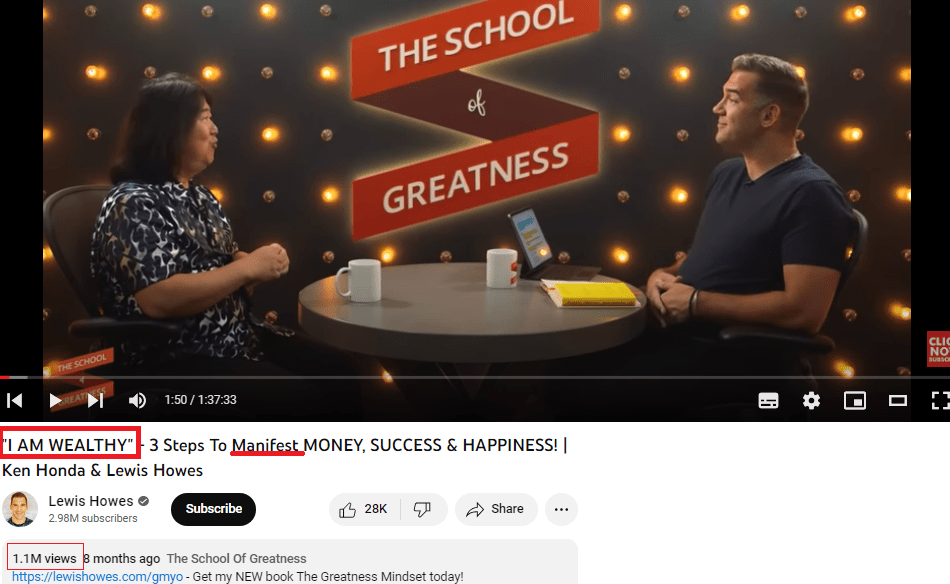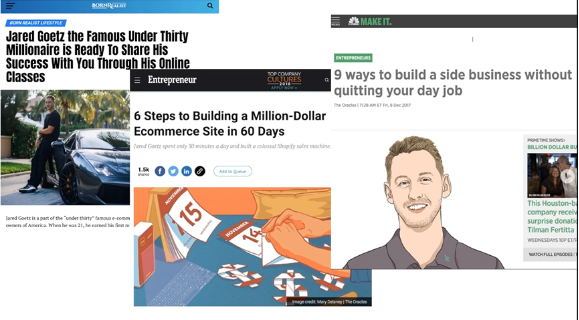The School Of Greatness Podcast: Psychology Behind The Titles
The School Of Greatness is a podcast hosted by Lewis Howes. This podcast has become one of the most popular in the world.
One of the reasons this podcast has become so popular, is the highly compelling titles used for podcast episodes.
These titles are designed to make people click and listen.
I have found myself drawn into listening to episodes of The School Of Greatness after reading the titles.
If you’re a content producer or a business owner, there is a lot you can learn from these podcast titles.
In this post, I’m going to analyze five of the most popular School Of Greatness episodes. I’ll be looking at the psychology behind the titles used on these episodes. I will examine exactly what makes these titles so click-worthy.
From this analysis, you’ll get insights into how you can fine-tune your own titles and headlines to attract more clicks. You can apply this whether you have a podcast, a YouTube channel, a blog or you run Facebook Ad campaigns.
You will also learn…
- Two power words that you can paste into your own headlines to get more clicks
- How to use confirmation bias – a powerful, proven psychological trigger
- How to take advantage of evolutionary biology in your headline
The 6-Step Formula To Become A MILLIONAIRE In 2023 (How To Build Wealth)
3.2 million views

With over 3.2 million views, this is one of the top podcasts on the School Of Greatness.
If you search online, you’ll quickly find hundreds of podcasts and videos on the topic of wealth. And videos about becoming a millionaire.
Even The School Of Greatness podcast has dozens of episodes on this topic.
So why did this one attract so many views?
There is one keyword in this title: Formula.
The word “formula” is one of the most powerful words you can use in a podcast headline or YouTube video title.
There are numerous reasons why this word is so powerful. And they help to explain why this podcast has had over 3.2 million views on YouTube.
Use of the word “formula” needs to be coupled with the promise of a desired outcome.
In this case, the desired outcome is building wealth and becoming a millionaire.
The term “formula” implies that someone has already discovered a solution or method for success. This gives the impression that there is a proven system in place that has worked for others.
As I mentioned previously, most people don’t want to figure things out on their own.
Instead, they want the road map to success. They want it all laid out for them.
“Formula” implies that somebody else has already done that hard work to figure it out.
Having a formula makes the process of becoming wealthy seem less overwhelming and more manageable.
In my article about Russel Brunson’s $3.2 million presentation, I explain the psychological power of words like “formula” and “process”.
How They Keep You POOR! (Watch This To Become A MILLIONAIRE In 2023)
2.8 Million Views

This podcast title is similar to the previous one.
Both appeal to the desire for quick wealth generation.
Notice how they both mention becoming a millionaire in 2023? That is a more subtle way of saying “become a millionaire fast.”
Both podcasts were published in late 2022 and early 2023, so becoming a millionaire in 2023, would mean becoming a millionaire in less than 12 months.
The prospect of getting rich quickly is always going to be alluring to a lot of people.
But this title doesn’t mention any formula. There is no “3 step process.” So what makes this title so effective?
The first five words: “How They Keep You POOR.”
This will appeal to people who feel victimized or feel that external forces are hindering their financial progress.
There is a comfort in being able to put the blame on external forces for ones own lack of financial success.
Some people will listen to this podcast in the hope that it will shift some of the blame away from them for their lack of wealth.
It will also appeal to people that hold pre-existing beliefs about the government or the elites trying to keep people poor.
This comes back to a concept that I’ve already discussed – confirmation bias. That is, people seek out information to confirm their existing beliefs.
The title also has a conspiracy theory element to it, which will draw in many people. Seeing this title, many people will conclude that there must be a ploy to keep the general population from generating wealth.
Conspiracy theories have a strong psychological appeal for various reasons…
Some people are drawn to conspiracy theories as a way to feel special or unique. They like the idea of being part of a select group of people that have access to “insider knowledge.”
Others are drawn to conspiracy theories by the emotional appeal.
Conspiracy theories can elicit strong emotions in people such as anger and fear.
The prospect of certain people acting to stop the general population from accumulating wealth, will generate a strong anger response in many people.
The DAILY HACKS To End Inflammation & Increase Your LIFESPAN
1.1 million views

This here is a great example of a benefit-driven headline.
The title highlights two key benefits that a listener can gain from listening to this podcast – ending inflammation and increasing lifespan. This appeals to the audience’s desire for improved health and longevity.
If you also consider the thumbnail on this video, it offers a third benefit: staying young.
A benefit-oriented title communicates the value or benefit the listener will receive. This aligns with the fundamental marketing principle of selling benefits, not features. When people see a direct benefit to themselves, they will be more motivated to listen.
But The School Of Greatness has other podcasts with benefit driven titles that don’t have nearly as many views as this one. So why has this title attracted so many views?
I attribute it to the use of ‘power words’ in the title..
The use of impactful words like “Hacks,” “End,” and “Increase” grabs attention and creates a sense of excitement. These power words evoke curiosity and imply that the podcast will provide valuable and actionable information.
The word “hack” is particularly powerful. This is because the human brain is hardwired to seek out shortcuts and efficiency. The term “hacks” suggests a shortcut or a more efficient way to achieve a desired outcome. This plays into our natural desire to save time and energy.
It also creates a sense of intrigue and mystery. It gives the impression that the reader will gain access to insider knowledge or tips that aren’t widely known. This mystery can make the content seem more intriguing and valuable.
The title raises questions about what these daily hacks are and how they can end inflammation and increase lifespan.
Viewers and listeners will wonder if they already know about these hacks. This piques curiosity, prompting viewers to click and watch the podcast to discover the answers.
The 3 Foods You Will NEVER EAT AGAIN After Watching This!
807k views

The effectiveness of this title can be explained by an evolutionary biology perspective. Humans have developed a tendency to pay attention to and be cautious of potential threats or harmful stimuli. This has been crucial for survival throughout our evolutionary history.
The podcast title, “The 3 Foods You Will NEVER EAT AGAIN After Watching This!” taps into this innate human fear response, making it appealing to a wide audience.
Those who see this title will wonder what those three foods are and whether they are already eating them. If they are eating those foods, it could be a potential threat to their survival.
Another Lewis Howes podcast, titled The TOP FOODS You Absolutely SHOULD NOT EAT To Live Longer has over 2.2 million views. It’s popularity can be explained by the same reason. People are programmed to pay attention to things that could pose a threat to them.
The title offers the hope that eliminating these specific foods from their diet could drastically transform their well-being.
This promise of a simple solution with potentially life-changing results can be highly appealing to individuals seeking quick fixes or looking for ways to improve their health without complicated interventions.
People are always looking for quick fixes that will have a big impact on the quality of their life.
This is why diet pills or supplements are appealing to so many people. Taking a single pill or supplement provides the hope of a positive impact. But with minimal effort.
“I AM WEALTHY” – 3 Steps To Manifest MONEY, SUCCESS & HAPPINESS!
1.1 Million Views

The mention of “3 Steps” suggests that the podcast will provide a clear and concise roadmap for achieving wealth, success, and happiness. This makes the content seem easily digestible and actionable, which attracts viewers looking for practical advice or guidance.
People are drawn to titles like this because they feel that it will provide them with a system that they can follow.
Most people don’t want to figure it out themselves. They want to be told what steps to take to achieve a desired outcome.
Having someone lay out a 3-step process for them is highly appealing.
The use of “I AM WEALTHY” in quotation marks is also extremely clever.
Those who have studied manifestation will be familiar with affirmations.
Affirmations are positive statements or phrases that are repeated consciously to reinforce a desired belief, attitude, or outcome. They are used as a tool for self-improvement and personal development, aiming to reprogram the subconscious mind and promote positive thinking.
An example of an affirmation would be “I am wealthy.” People will repeat a statement like this over and over in the hope that it would reprogram their subconscious mind.
The title of this video will lead people to believe that using this affirmation may be one of the three steps towards manifesting money, success and happiness.
People who are already using affirmations in their life will be drawn to this video because it may offer further evidence that affirmations are an effective tool to use.
The podcast could help to confirm their existing beliefs about manifestation.
People are constantly looking for information to support their existing beliefs. So that they can feel confident that they are on the right track.
This also applies to anyone who is interested in manifestation.
Someone who believes in manifestation will listen to this podcast, hoping that it will help confirm their existing beliefs about manifestation.
This is a psychological principle known as confirmation bias.
Another example of how to leverage confirmation bias in a podcast title or a headline would be “Why Everyone Should Follow A Paleo Diet.”
Those who follow a paleo diet are likely to click on this title, seeking confirmation on their existing beliefs about the Paleo diet.
In my article on the most viral headlines from the Huff Post, I provide further examples of how confirmation bias is used to attract clicks. Headline #9 in that article offers a great example of this.
How You Can Apply This
The purpose of this post is to give you ideas you can apply to your own titles and headlines.
Whether you have your own podcast, a YouTube channel or you write a blog, the lessons from this post can help you get more listens, views and clicks.
Let’s consider how you can copy what worked for The School Of Greatness in these extremely popular podcast episodes.
Use Power Words
I covered two major power words that were used in the podcast titles.
Those were “formula” and “hacks”.
Both of these words have incredible power when used in a headline, title or anywhere in sales copy. Especially if you’re selling some kind of transformation. That could be a financial transformation, a health transformation or a spiritual transformation.
But these aren’t the only power words you can use. Try searching on Google for power words that are relevant to a video or podcast that you’re releasing. Or you could go to ChatGPT for further ideas.
Use Benefit Driven Headlines
Every podcast title that I covered in the article had at least one benefit associated with it.
Potential viewers or listeners would see the title and know that there would be at least one thing they would gain from listening to the podcast.
People are driven by self-interest. Offer them a benefit that will improve their life in some way and you will have their interest.
Create Curiosity
Every example featured in this post leverages the power of curiosity.
If you can generate curiosity in your headlines or titles, many people won’t be able to resist the temptation to click your headline.
The key to building curiosity is to pose a question in the viewer’s mind and leave it unanswered. The viewer must consume your content to get an answer.
For example, consider this title – “Scientists Believe This Is A Miracle Herb.”
The obvious question is “what is this miracle herb?”
But it also raises other questions to create more curiosity…
Why do scientists think it’s a miracle? What benefits does it have? Am I already using this herb?
The more questions you can raise, the greater the curiosity you’ll create.
If you’d like to learn more about the psychology of podcast titles and video headlines, check out my article about Graham Stephan’s YouTube channel. In that article, I analyze the psychology behind the titles used in his most popular videos.







